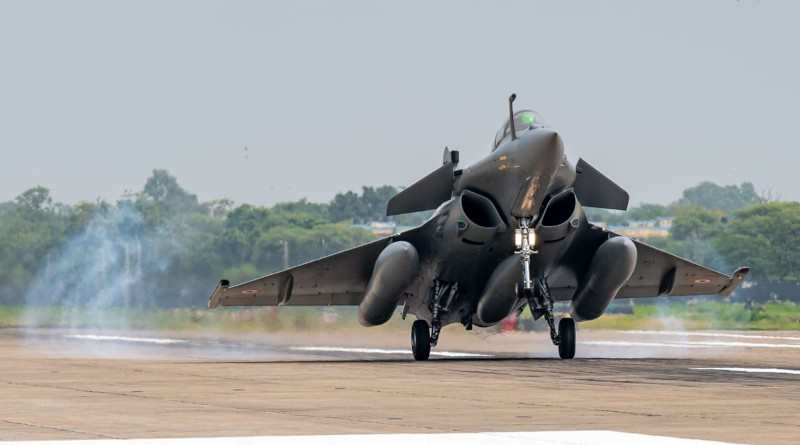India’s Acquisition of Rafale Fighter Jets And Scorpene Class Submarines: Impact On Balance Of Power In South Asia – OpEd
In a major development, India is planning to buy 26 Rafale fighter aircraft and three Scorpene class conventional submarines from France. The proposals have been placed before the Defence Ministry.
As per the proposal, the Indian Navy will get 22 single-seated Rafale Marine aircraft along with four trainer aircraft. The Navy had been pressing for acquiring these fighter aircraft and submarines urgently as they have been facing shortages in view of the security challenges around the country. The aircraft carriers INS Vikramaditya and Vikrant have been operating the MiG-29s and need the Rafales for operations on both carriers. Meanwhile, the three Scorpene class submarines would be acquired under the repeat clause by the Navy as part of Project 75 where they would be built in the Mazagon Dockyards Limited in Mumbai.
India, procurement, Rafale fighter aircraft, Scorpene class submarines, France, PM Modi’s visit, will shift the balance of power, South Asia, resulting in an arms race between India-Pakistan. This arms buildup is a significant development in the geopolitical landscape of South Asia. This strategic move has the potential to disturb the delicate balance of power in the region. The acquisition of advanced military equipment such as Rafale fighter aircraft and Scorpene class submarines enhances India’s defense capabilities and strengthens its position as a dominant regional power. With these state-of-the-art assets at its disposal, India gains a significant advantage in terms of air superiority and naval warfare capabilities against its rivals.
This shift in military dynamics has serious implications for the neighboring countries, particularly Pakistan. The existing power equilibrium in South Asia would be disrupted, as Pakistan perceives this move as a threat to its national security. In response to India’s bolstered military capabilities, Pakistan might feel compelled to enhance its own defense arsenal by seeking similar acquisitions or forming alliances with other nations. The potential arms race between India and Pakistan raises concerns about regional stability and peace. It is crucial for international stakeholders to closely monitor this situation and actively engage in diplomatic efforts to prevent any escalation of tensions. Dialogue between both countries should be encouraged to address mutual concerns and find peaceful resolutions.
The acquisition of Rafale fighter aircraft and Scorpene class submarines is evidence of India’s dreams of becoming the regional hegemon and challenge China in its bid to modernize its defense forces. The Rafale, renowned for its advanced technology and combat capabilities, will provide India with enhanced air superiority, precision strike capabilities, and increased deterrence against potential adversaries. These multi-role fighters are equipped with cutting-edge radar systems, long-range missiles, and state-of-the-art avionics, ensuring superiority in both air-to-air and air-to-ground engagements. Similarly, the Scorpene class submarines will bolster India’s naval power projection capabilities. These submarines are known for their stealth features, advanced weapon systems, and long-range endurance. With their ability to conduct intelligence gathering, surveillance, and anti-submarine warfare operations, India will be able to protect its maritime interests more effectively.
The use of such advanced military assets by India will impact the equivalence of power in South Asia. Pakistan, India’s long-standing regional rival, is likely to perceive these acquisitions as a threat to its own security. This perception may prompt Pakistan to seek countermeasures and bolster its defense capabilities through strategic partnerships, international arms procurement, and even an arms race. Such reactions can create an environment of heightened tension and instability in the region.
Furthermore, the acquisition of Rafale fighter aircraft and Scorpene class submarines by India may influence the dynamics of other neighboring countries. Nations in South Asia will carefully observe India’s military advancements and evaluate their own defense strategies accordingly. Some countries may perceive a need to align themselves more closely with China to maintain regional stability, while others might feel compelled to bolster their own military capabilities as a precautionary measure.
The procurement of advanced military assets by India can potentially trigger an arms race in South Asia. Pakistan, with its longstanding security concerns vis-à-vis India, might respond by acquiring similar or more advanced weaponry to maintain a balance of power. This scenario could lead to a costly and destabilizing competition for military dominance between the two nations. An arms race in the region would divert significant resources away from socio-economic development, exacerbate tensions, and escalate the risk of conflict. It is crucial for diplomatic efforts and dialogue to play a central role in preventing such a scenario and promoting peaceful resolutions to outstanding disputes.
The acquisition of Rafale fighter aircraft and Scorpene class submarines by India will not only impact the regional balance of power but also have wider geopolitical implications. India’s enhanced military capabilities can position it as a more influential player in global affairs. This newfound influence may enable India to assert itself in matters of regional security, maritime trade, and international diplomacy. India’s strengthened defense capabilities may also attract attention from major powers, leading to potential shifts in alliances and partnerships in the region. It is essential for all stakeholders to manage these developments to ensure stability and peaceful coexistence in South Asia.
The procurement of Rafale fighter aircraft and Scorpene class submarines by India from France during PM Modi’s visit has introduced new dynamics that could disturb the balance of power in South Asia. The possibility of an arms race between India and Pakistan necessitates strategic interventions from international actors to ensure regional stability is maintained through peaceful means. As India assumes a more influential role on the global stage, it is vital for all stakeholders to engage in constructive dialogue and work towards mutually beneficial solutions. Preserving peace, promoting regional cooperation, and addressing security concerns are essential for sustainable development in South Asia.

